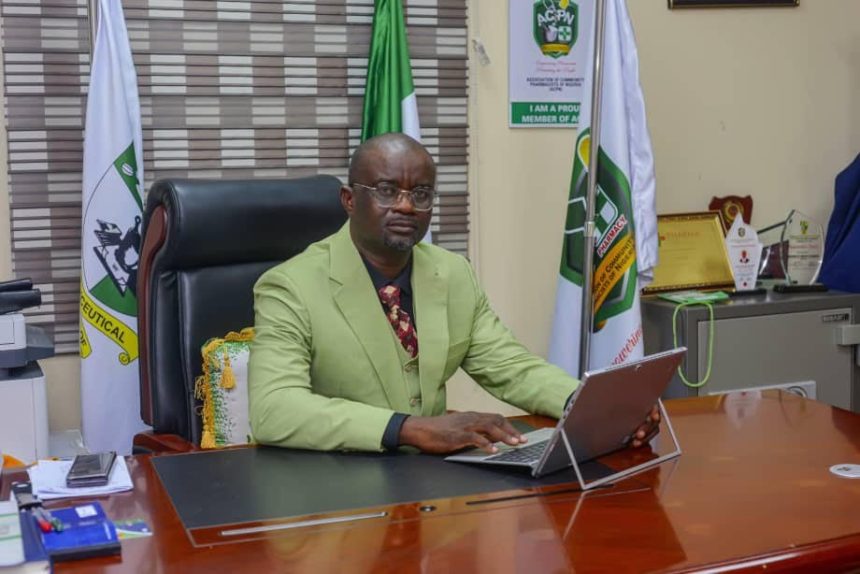The Association of Community Pharmacists of Nigeria (ACPN) has disclosed that Nigeria now has over 150 registered pharmaceutical manufacturers, with at least five of them certified by the World Health Organization (WHO) for Good Manufacturing Practice (GMP), a milestone that underlines the industry’s growing potential despite prevailing challenges.
This was revealed ahead of the association’s 44th Annual National Conference, scheduled to hold in Awka, Anambra State, from July 22 to 27, 2025.
Speaking with journalists during a pre-conference media briefing, the National Chairman of ACPN, Ambrose Ezeh, emphasised that the pharmaceutical sector is on a steady path to becoming a multi-billion-dollar industry.
ALSO READ: Manufacturers ready to support government in growing nation’s economy
“Make no mistake about it, the pharma industry continues to grow despite all odds,” Pharm. Our local manufacturers, including prominent Nigerian investors, are building Active Pharmaceutical Ingredient (API) plants with investments running into tens of millions of dollars.
“These efforts are changing the structure of the game and helping to impose medicines security in Nigeria.”
He cited examples of pharmaceutical giants such as Fidson Healthcare, which has played a major role in the production of anti-retroviral drugs, Emzor Pharmaceuticals, which recently commissioned a Cephalosporin plant, and Jawa Pharmaceuticals, an Indian company that has launched a beta-lactam production site in Nigeria.
According to Ezeh, with recent investments and strategic expansion, the industry is projected to grow from its current estimated value of $2 billion to as much as $10 billion in the next five years.
The ACPN also commended Codix Healthcare for establishing a local facility for the manufacture of in-vitro diagnostic kits and medical consumables, further boosting the country’s capacity for self-reliance in essential health products.
He added that despite the advancement, the association noted that the sector still requires deliberate support from the government.
“We urge the government at all levels to support pharma manufacturers with special incentives, including access to equipment and raw materials that meet GMP standards.
“Local manufacturing presents immense opportunities for job creation, economic growth, international trade, and even national security,” Ezeh said.
He warned that poorly implemented policies, such as the controversial MEDIPOOL program, could derail progress if stakeholders like pharmacists are not properly consulted.
“Policies must not be developed in isolation. The Federal Ministry of Health must reach out more to stakeholders in pharmacy practice before rolling out reforms,” he added.
ACPN also called on the government to amend the Fake Drug Act to include stiffer penalties for defaulters and to fully implement the National Drug Distribution Guidelines (2015), which aim to sanitise Nigeria’s chaotic drug supply chain.
Turning to professional politics in the health sector, Pharm. Ezeh expressed disappointment over what he described as “continued subjugation of pharmacists and other healthcare professionals by physicians,”whom he accused of influencing policy in their favour.
He said: “Government continues to indulge physicians who want every title, office or privilege in healthcare to be exclusive to members of the Nigerian Medical Association (NMA).
“This undermines the professional autonomy of other qualified health professionals.”
Ezeh , also questioned why only physicians are appointed as Chief Executive Officers of Federal Health Institutions and lamented that despite the establishment of the consultant cadre for pharmacists in 2015, many hospitals still refuse to implement it.
“As a profession, we have spent millions to train ourselves for the fellowship programme that leads to consultant status, yet we are being frustrated at every level,” he said. “Ironically, physicians who receive government-funded training often leave the country, while pharmacists who pay from their pockets are denied career progression.”
The association also took a firm stand against the proposed National Health Facility Regulatory Authority (NHFRA) Bill currently before the National Assembly, warning against any attempt to merge the Pharmacy Council of Nigeria (PCN) with other regulatory bodies.
“It is one of the reasons Nigeria achieved WHO Maturity Level 3 in medicines regulation. A merger would dilute our effectiveness and derail years of progress”.
He added that international best practices in countries like the United States, the UK, Canada, and South Africa maintain independent pharmacy councils to preserve professional standards and public safety.
As the Awka conference draws near, the ACPN reiterated its commitment to reforms that would ensure the availability, accessibility, and affordability of safe and quality medicines in Nigeria.
“The vision is clear,” Ezeh said. “We will keep moving forward, as the scripture says, ‘I, the Lord, bring down the tall tree and make the low tree grow tall, I have spoken and I will do it”.
WATCH TOP VIDEOS FROM NIGERIAN TRIBUNE TV
- Let’s Talk About SELF-AWARENESS
- Is Your Confidence Mistaken for Pride? Let’s talk about it
- Is Etiquette About Perfection…Or Just Not Being Rude?
- Top Psychologist Reveal 3 Signs You’re Struggling With Imposter Syndrome
- Do You Pick Up Work-Related Calls at Midnight or Never? Let’s Talk About Boundaries







